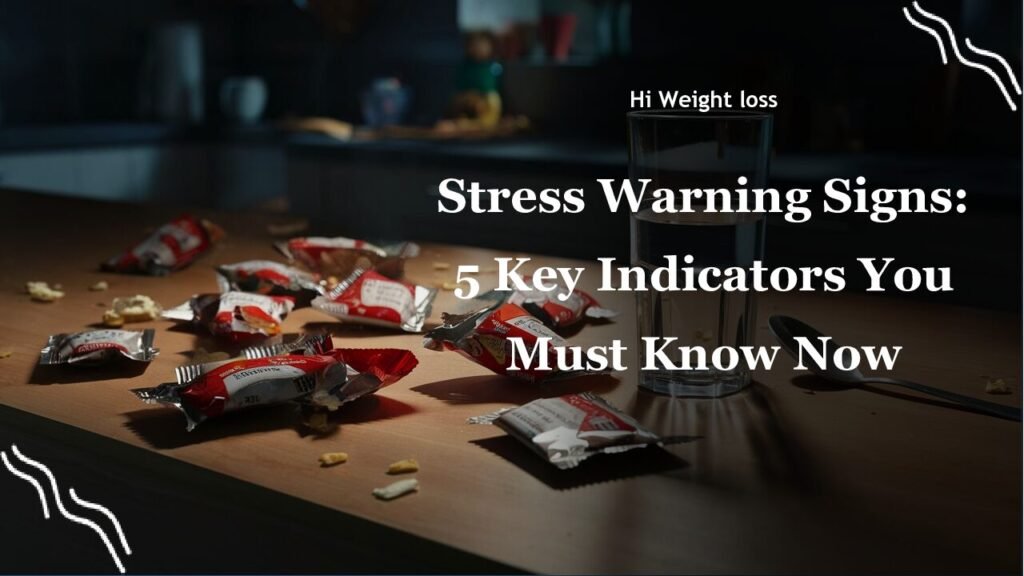“`
Are you feeling overwhelmed, like you’re constantly walking a tightrope? Stress can sneak up on you, and before you know it, it’s affecting your body, your behavior, and your emotions. Recognizing the warning signs of stress is crucial for taking control and preventing burnout; this blog post will help you understand what are 5 warning signs of stress, so you can manage it effectively and reclaim your well-being.
Understanding the Physical Symptoms of Stress
Ever notice how stress seems to manifest physically? It’s not all in your head; your body definitely reacts. Let’s delve into some common physical indicators that your stress levels might be too high. I remember during a particularly stressful period at work, I started experiencing tension headaches almost daily, which made focusing on tasks even more difficult.
One of the most common physical symptoms of stress are *headaches and muscle aches*. According to WebMD, these are direct effects of how stress impacts our body. These aches can range from minor discomfort to severe pain that disrupts your day.
Do you find yourself tossing and turning at night? *Sleep problems*, like difficulty falling asleep or insomnia, are another frequent sign of stress. Mind.org.uk notes that these sleep issues often stem from a racing mind and an inability to relax.
Have you ever felt butterflies in your stomach, but not the good kind? *Upset stomach* is a common physical response. Digestive issues, such as diarrhea, constipation, or nausea, can be triggered by stress, as Suffolk University points out. During a particularly difficult week, my colleague mentioned experiencing similar symptoms, including nausea before important deadlines.
*Fatigue* is another warning sign. When you are constantly stressed, your body can feel like it is running on empty. Even if you get a good night’s sleep, you might still feel perpetually tired, a fact highlighted by WebMD.
Finally, *chest pain and rapid heartbeat* can be alarming symptoms of stress. These are physical signs of tension and anxiety, according to both Suffolk University and WebMD. If you experience these symptoms frequently, consulting a doctor is essential.
Behavioral Changes Caused by Stress
Stress doesn’t just manifest physically, it also affects your behavior. Think about the habits you fall into when you’re feeling overwhelmed. It’s easy to recognize stress in others, but what about yourself? Let’s see how your actions might be signaling underlying stress.
Have you noticed a shift in your eating habits? Stress can lead to *changes in eating habits*, such as eating more than usual or losing your appetite completely. As both Suffolk University and WebMD explain, this is a common stress response.
Do you keep putting off important tasks? Stress can result in *procrastination and avoidance* of responsibilities. As noted by WebMD, this is often our way of trying to manage overwhelming feelings. I recall a time when I put off writing an important report because the thought of it was so overwhelming I ended up cleaning my entire apartment instead!
Another concerning behavioral shift is the *increased use of substances*. Turning to alcohol, tobacco, or drugs to cope with stress is common, as discussed by Suffolk University and WebMD. This can lead to additional health problems and make long term stress management more difficult.
Do you find yourself wanting to be alone more often? *Isolating self from others* is a behavioral sign of stress. Mind.org.uk highlights this tendency to withdraw from social interactions during stressful times. I noticed that when I felt stressed, I would often decline invitations from friends and prefer to spend time alone, feeling I was less stressed by not socializing, which ironically made me feel more stressed and isolated.
*Nervous behaviors*, such as nail-biting, fidgeting, and pacing are also telling signs. WebMD points out that these are often physical manifestations of underlying anxiety and tension.

Emotional Warning Signs of Stress
Beyond the physical and behavioral symptoms, stress can significantly impact your emotional state. How you feel emotionally is a strong indicator of how stress is affecting you. It is vital to pay attention to these signs to manage stress effectively. Have you noticed changes in your mood or reactions to situations? Let’s look at the common emotional warning signs.
Do you find yourself getting easily frustrated or angry? *Irritability and anger* are classic signs of stress. Mind.org.uk and Stress.org both highlight these emotional reactions as common indicators of elevated stress. During a particularly stressful work project, I remember my temper flaring at the smallest things, even towards my family, which was out of character for me.
Do you often experience a sense of unease? *Anxiety and fear* are frequent emotional responses to stress. Mind.org.uk explains how stress can trigger overwhelming feelings of worry and apprehension. I have had days where I feel that the whole world is turning on me, and this sense of fear has brought me to tears several times.
A persistent feeling of sadness and indifference might mean that you are experiencing *depression and loss of interest*. As Mind.org.uk notes, this can be a sign of stress taking a significant toll on your mental health. I saw a good friend of mine becoming less and less interested in their favorite sports team, and it concerned me greatly until they opened up about the stress they were under.
*Intolerance and irritability* towards others can also be indicative of high stress levels. Suffolk University points out that stress can cause individuals to react more negatively and easily towards others. Have you ever heard your friends or family comment on how easily you snap?
Finally, an increased *fear of failure* can be a key emotional sign of stress. According to Mind.org.uk, when we are under stress, our self-confidence can plummet, leading to overwhelming anxiety about potential shortcomings.
Table of Stress Symptoms
To make the information easier to digest, here’s a table summarizing the key warning signs of stress across physical, behavioral, and emotional categories:
| Category | Symptom | Example |
|---|---|---|
| Physical | Headaches and Muscle Aches | Tension headaches, back pain |
| Physical | Sleep Problems | Insomnia, difficulty staying asleep |
| Physical | Upset Stomach | Nausea, diarrhea, constipation |
| Physical | Fatigue | Feeling tired even after enough sleep |
| Physical | Chest Pain and Rapid Heartbeat | Increased heart rate and chest tightness |
| Behavioral | Changes in Eating Habits | Eating more or less than usual |
| Behavioral | Procrastination and Avoidance | Putting off tasks, avoiding responsibilities |
| Behavioral | Increased Use of Substances | Alcohol, tobacco, or drugs to cope |
| Behavioral | Isolating Self from Others | Withdrawing from social interactions |
| Behavioral | Nervous Behaviors | Nail-biting, fidgeting, pacing |
| Emotional | Irritability and Anger | Easily frustrated and quick to anger |
| Emotional | Anxiety and Fear | Feelings of worry and apprehension |
| Emotional | Depression and Loss of Interest | Loss of interest in things, persistent sadness |
| Emotional | Intolerance and Irritability | Reacting negatively to others easily |
| Emotional | Fear of Failure | Increased anxiety about potential shortcomings |
Conclusion
Recognizing the warning signs of stress is the first step toward effective management. Stress can show itself in many ways, affecting your physical health through headaches, muscle aches, sleep problems, digestive issues, fatigue, and chest pains. Behaviorally, it can manifest as changes in eating habits, procrastination, substance abuse, isolation, and nervous mannerisms. Emotionally, you may experience increased irritability, anxiety, depression, intolerance, and fear of failure. My own experience with the physical symptoms of stress, and seeing it in others, has shown me how quickly it can creep up on you. By tuning into your body and mind, you can take prompt actions to address it and lead a more balanced, and healthier life. Remember that acknowledging and addressing these signs is essential to your well-being.
Now that you understand the myriad ways stress can manifest, why not take a moment to reflect on your own experiences? Are there any signs you’ve been overlooking? We encourage you to start managing stress today by trying the techniques you’ve learned about here, or by sharing this article with someone you think might be struggling. Remember, you’re not alone in this, and acknowledging is the first step.
FAQ
What are the most common physical signs of stress?
The most common physical signs of stress include headaches, muscle aches, sleep problems (like insomnia), upset stomach (including nausea and digestive issues), fatigue, and chest pain with rapid heartbeat.
How does stress affect behavior?
Stress can significantly change your behavior. It often leads to changes in eating habits, increased procrastination and avoidance of tasks, reliance on substances like alcohol, a tendency to isolate yourself from others, and the development of nervous behaviors such as nail-biting and pacing.
What are the key emotional indicators of stress?
Key emotional indicators of stress include increased irritability and anger, feelings of anxiety and fear, depression and a loss of interest in activities, intolerance towards others, and an overwhelming fear of failure. These emotions indicate that stress is significantly impacting your mental well-being.
Can stress cause digestive problems?
Yes, stress can cause various digestive problems. Upset stomach is a common symptom, which can manifest as nausea, diarrhea, and constipation. These issues are directly linked to how stress impacts the body’s digestive system.
Where can I find more information about the signs of stress?
You can find more information on the warning signs of stress from reputable sources such as Suffolk University, WebMD, and Mind.org.uk. These resources provide detailed explanations and further guidance.
“`



